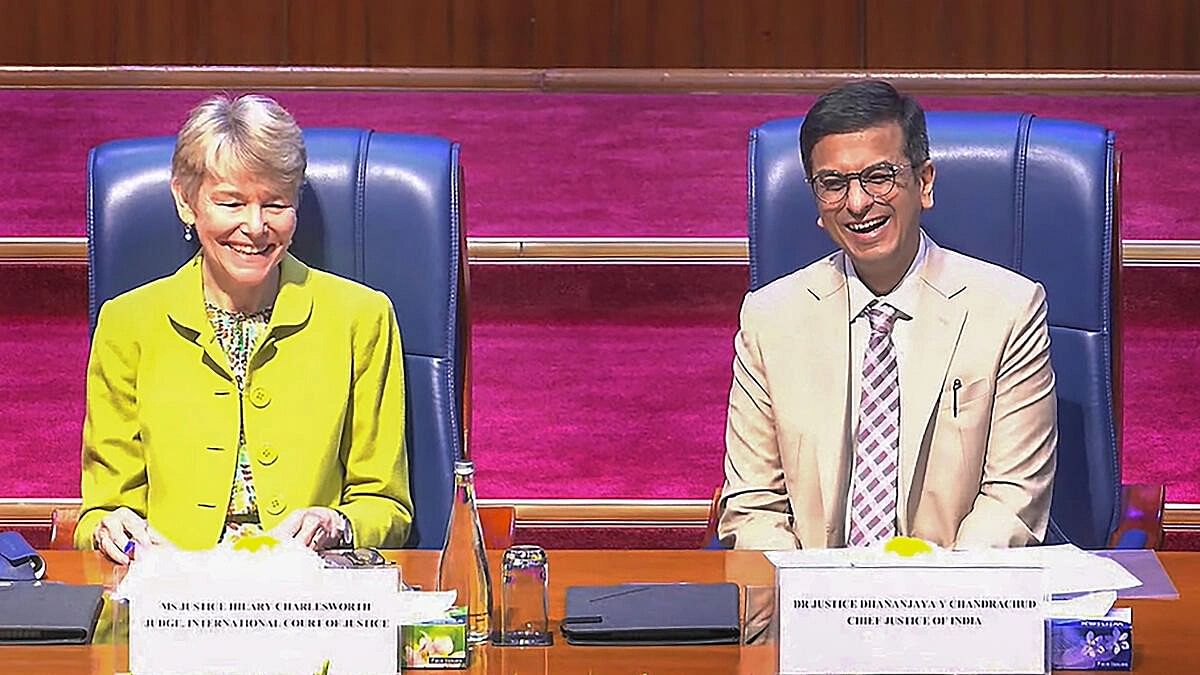
Chief Justice of India (CJI) Justice DY Chandrachud with International Court of Justice judge Hilary Charlesworth during the Foundation Day lecture, in New Delhi, Saturday, Feb. 10, 2024.
Credit: PTI Photo
New Delhi: International Court of Justice judge Hilary Charlesworth on Saturday said judicial independence is critical for the operation of legal institutions, particularly in volatile political contexts.
She said the international judiciary can draw inspiration from the distinguished history of independence of India’s top court.
Charlesworth was delivering the second annual lecture on ‘The International Court of Justice: A legal forum in a political environment’ on the Supreme Court premises.
She is an Australian international lawyer who has been a Judge of the ICJ since November 5, 2021. Charlesworth said that the international judiciary can draw inspiration from the distinguished history of independence of India’s apex court.
“Judicial independence is critical to the operation of legal institutions, particularly in volatile political contexts,” she said.
Referring to the role of the ICJ in the Kulbhushan Jadhav case, she said the international court’s judgment did not resolve the tension between India and Pakistan. “At least it provided a resolution and (that too a) legal resolution to an acute problem dividing them," she said.
In April 2017, Jadhav was sentenced to death by a Field General Court Martial in Pakistan. His execution was stayed by the ICJ pending final adjudication of the case.
Charlesworth said judicial independence in the international context is aimed at eliminating any non-legal considerations that might affect a judge’s reasoning.
Quoting Chief Justice D Y Chandrachud’s recent talk at the ICJ’s ceremonial sitting, the judge said, “Introspection is the art of bringing the seemingly unattainable within the line of vision”, and congratulated the apex court on its foundation day.
She said both, the Indian apex court and the ICJ, faced the task of “navigating highly charged political environments”. “The international judiciary, I think, can draw inspiration from the Supreme Court of India’s distinguished history of independence, innovation,” she said.
She pointed out that the ICJ had a “poor record” in giving attention to gender balance and in almost eight decades, just six women had been elected as judges as compared to 109 men.
Speaking about Indian judges at the ICJ, she said Judge Nagendra Singh was the longest serving judge, being in the court for 15 years in the 1970s and 80s.
“In three out of the six cases involving India during the court’s (last) eight decades, there was no Indian judge already on the bench. And so various distinguished Indian jurists were appointed as judges ad hoc,” Judge Charlesworth said.
CJI Chandrachud spoke of Judge Charlesworth as being an esteemed scholar, a pioneering feminist thinker and an old friend.
"We had forged a strong academic journey at Harvard Law School. Our friendship extended beyond the classroom and helped us navigate the rigours of academics,” he said. CJI Chandrachud spoke on how Integrating gender diversity within courts would help ensure better outcomes.
"Judge Charlesworth has brought the feminist school of jurisprudence into mainstream," he added. Supreme Court judge Justice Surya Kant delivered the welcome remarks on the occasion.
